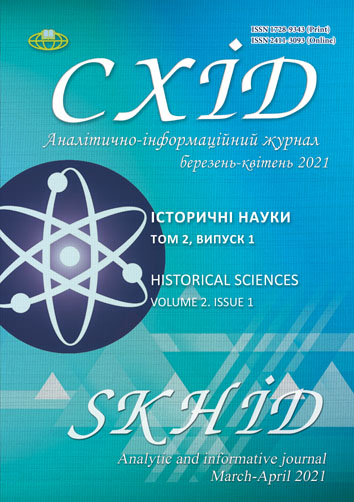CONCEPTUAL PRINCIPLES OF RESEARCH OF THE PROBLEMS OF ADAPTATION AND INTEGRATION OF MUSLIM FEMALE REFUGEES IN GERMANY
DOI:
https://doi.org/10.21847/1728-9343.2021.2(1).230076Keywords:
adaptation, asylum, gender inequality, Germany, integration, Muslim female refugees, pandemic, refugee womenAbstract
The article is devoted to the processes of Muslim women fleeing to Germany. In the article, the authors consider the Muslim women fleeing to Germany in conditions of increased conflict in their countries of origin as a separate type of refugees. An attempt has been made to characterize the psycho-social condition of refugee women who arrived in Germany and to determine their qualitative and quantitative characteristics. The authors paid attention to what factors affect their involvement in society. Our study has proved that refugees are a separate component of German society because they directly affect the demographic and socio-economic situation in Germany. Ensuring the stable and effective socio-economic development of Germany with the involvement of all categories of the population is directly related to the implementation of public policy. The study of the gender aspects of refugees may help to identify key issues, the solution of which will facilitate the rapid adaptation and integration of Muslim refugees in German society, and, in prospect, to actively involve them in the development of German society.
The results of the study helped in the analysis of the integration and adaptation processes of Muslim refugees as a separate part of refugees. Women refugees are a more vulnerable category of refugees, so they can be easily manipulated and abused. Identifying problems during integration may help to improve mechanisms for the protection of refugees and asylum seekers.
In this article, the authors focused on the impact of the COVID-19 pandemic on the reception and adaptation of refugees, as well as the establishment of new rules to meet the basic needs of refugees in shelters, the lack of which is unsanitary norms and the impossibility of distancing. The COVID-19 pandemic has changed the decision-making process and refugee reception procedures, so the analysis of the challenges points to weaknesses in human rights mechanisms for refugees.
Downloads
References
Ankenbrand, B. (2002). Refugee Women under German Asylum Law. International Journal of Refugee Law, 14 (1): 45-56. https://doi.org/10.1093/ijrl/14.1.45
Bertran, K. (2014). Paradoksy immigratsionnoi politiki Evro-peiskogo Soiuza. Lex Russica, 4: 485-492. https://doi.-org/10.7256/1729-5920.2014.4.10805 (In Russian).
Boswell, C. & Geddes, A. (2011). Migration and Mobility in the European Union. London, Basingstoke: Palgrave Macmillan, 272 p.
Castles, S. (2011). Migration, Crisis, and the Global Labour Market. Globalizations, 8 (3): 311-324. https://doi.org/-10.1080/14747731.2011.576847
Chuienko, V. (2016). «Ievropeiska kryza bizhentsiv» yak naiaktualnisha problema Yevropeiskoho Soiuzu. Natsionalnyy yuridicheskiy zhurnal: teoriya i praktika. August: 2112-216. http://www.jurnaluljuridic.in.ua/¬archi-ve/2016/4/46.pdf (In Ukrainian)
Dawa, R. (2017). Arab refugee women in Germany torn over romantic relationships. Deutsche Welle. https://www.-dw.com/en/arab-refugee-women-in-germany-torn-over-romantic-relationships/a-36990211
Depetris-Chauvin, E. & Santos, R. (2018). Followed by Violence: Forced Immigration and Homicides. Pontificia Universidad Católica de Chile. http://economia.-uc.cl/publicacion/followed-by-violence-forced-immigration-and-homicides/
Elle, J. & Hees, S. (2018). Gender in the German refugee debate - reflections on shortcomings, side-effects, and pitfalls. Respond. August, 9. https://respond-migration.com/blog-1/sanliurfa-gzynz-rh3gn-rzyss .
Fazel, M., Wheeler, J., & Danesh, J. (2005). Prevalence of serious mental disorder in 7000 refugees resettled in western countries: A systematic review. The Lancet, 365, 1309-1314. https://doi.org/10.1016/S0140-6736(05)61027-6
Hahn, E.& Richter, D. & Schupp, J. & Back, M. (2019). Predictors of Refugee Adjustment: The Importance of Cognitive Skills and Personality. Collabra: Psychology. https://online.ucpress.edu/collabra/article/5/1/23/113014/Predictors-of-Refugee-Adjustment-The-Importance-of.
Hynie, M. (2018). Refugee Integration: Research and Policy. Peace and Conflict Journal of Peace Psychology. 24(3): 265-276. http://dx.doi.org/10.1037/pac0000326
Keita, S., Dempster, H. (2020). Five Years Later, One Million Refugees Are Thriving in Germany. Center for Global Development. https://www.cgdev.org/blog/five-years-later-one-million-refugees-are-thriving-germany.
Menz, Georg (2006). ‘Useful’ Gastarbeiter, Burdensome Asylum Seekers, and the Second Wave of Welfare Retrenchment: Exploring the Nexus between Migration and the Welfare State, in Craig Parsons and Timothy Smeeding (eds.), Immigration and the Transformation of Europe. Cambridge: Cambridge University Press: 393–418.
Messina, A.M. (2007). The Logics and Politics of Post-WWII Migration to Western Europe. Cambridge: Cambridge University Press. 304 p.
Mosel, I. & Smart, C. & Foresti M. etc (2019, November, 1). Public narratives and attitudes towards refugees and other migrants. ODI. https://www.odi.org/sites/odi.-org.uk/files/resource-documents/12970.pdf.
Petryk, A. (2017). Mihratsiina kryza v Yevropi. Napryamy stiykoho zrostannya u svitoviy ekonomitsi: Conference Pepers. http://dspace.wunu.edu.ua/bitstream/316497/23-071/1/105-108.pdf (In Ukrainian)
Pylypchuk, K. (2017). Problemy bizhentsiv u sviti. Napryamy stiykoho zrostannya u svitoviy ekonomitsi: Conference Pepers. http://dspace.wunu.edu.ua/bitstream/316497/-23072/1/108-110.pdf (In Ukrainian)
Sansonetti, S. (2016) Female refugees and asylum seekers: the issue of integration. European Parliament. https://www.europarl.europa.eu/ RegData/etudes/STUD-/2016/556929/IPOL_STU(2016)556929_EN.pdf.
Solodko, A. (2015). Analiz polityky intehratsii bizhentsiv ta osib, yaki potrebuiut dodatkovoho zakhystu. Kyiv: Tsentr doslidzhennia suspilstva, 2015. 37 p. (In Ukrainian)
Wike, R. & Strokes, B. & Simmons, K. (2016). Europeans Fear Wave of Refugees Will Mean More Terrorism, Fewer Jobs. Pew Research Center. https://www.pewresearch.org/global/2016/07/11/europeans-fear-wave-of-refugees-will-mean-more-terrorism-fewer-jobs/
Downloads
Published
How to Cite
Issue
Section
License
Copyright (c) 2021 Марина Фротвейт, Шкодич Анна

This work is licensed under a Creative Commons Attribution-NonCommercial-NoDerivatives 4.0 International License.
1. Authors bear responsibility for the accuracy of facts, quotations, numbers and names used.
2. Manuscripts are not sent back.
3. The publisher does not always agree with the authors' opinion.
4. The authors reserve the right to authorship of the work and pass the first publication right of this work to the journal under the terms of a Creative Commons Attribution-NonCommercial-NoDerivatives 4.0 International License. This license allows others to distribute (copy) the published work for non-commercial purposes, provided there is mandatory attribution to its authors and a link to the first publication in our journal.
5. The authors have the right to conclude separate supplement agreements that relate to non-exclusive work distribution in the form in which it has been published by the journal (for example, to upload the work to the online storage of the journal or publish it as part of a monograph), provided that the reference to the first publication of the work in this journal is included.

